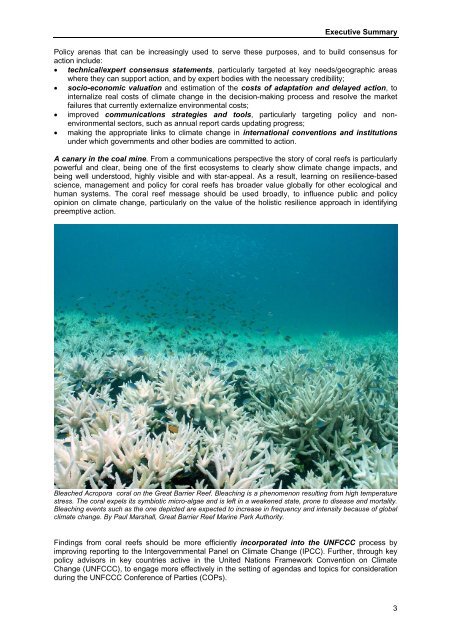Obura2009-IUCN Congress report - Resilience sessions
Obura2009-IUCN Congress report - Resilience sessions.pdf
Obura2009-IUCN Congress report - Resilience sessions.pdf
You also want an ePaper? Increase the reach of your titles
YUMPU automatically turns print PDFs into web optimized ePapers that Google loves.
Executive Summary<br />
Policy arenas that can be increasingly used to serve these purposes, and to build consensus for<br />
action include:<br />
• technical/expert consensus statements, particularly targeted at key needs/geographic areas<br />
where they can support action, and by expert bodies with the necessary credibility;<br />
• socio-economic valuation and estimation of the costs of adaptation and delayed action, to<br />
internalize real costs of climate change in the decision-making process and resolve the market<br />
failures that currently externalize environmental costs;<br />
• improved communications strategies and tools, particularly targeting policy and nonenvironmental<br />
sectors, such as annual <strong>report</strong> cards updating progress;<br />
• making the appropriate links to climate change in international conventions and institutions<br />
under which governments and other bodies are committed to action.<br />
A canary in the coal mine. From a communications perspective the story of coral reefs is particularly<br />
powerful and clear, being one of the first ecosystems to clearly show climate change impacts, and<br />
being well understood, highly visible and with star-appeal. As a result, learning on resilience-based<br />
science, management and policy for coral reefs has broader value globally for other ecological and<br />
human systems. The coral reef message should be used broadly, to influence public and policy<br />
opinion on climate change, particularly on the value of the holistic resilience approach in identifying<br />
preemptive action.<br />
Bleached Acropora coral on the Great Barrier Reef. Bleaching is a phenomenon resulting from high temperature<br />
stress. The coral expels its symbiotic micro-algae and is left in a weakened state, prone to disease and mortality.<br />
Bleaching events such as the one depicted are expected to increase in frequency and intensity because of global<br />
climate change. By Paul Marshall, Great Barrier Reef Marine Park Authority.<br />
Findings from coral reefs should be more efficiently incorporated into the UNFCCC process by<br />
improving <strong>report</strong>ing to the Intergovernmental Panel on Climate Change (IPCC). Further, through key<br />
policy advisors in key countries active in the United Nations Framework Convention on Climate<br />
Change (UNFCCC), to engage more effectively in the setting of agendas and topics for consideration<br />
during the UNFCCC Conference of Parties (COPs).<br />
3


















